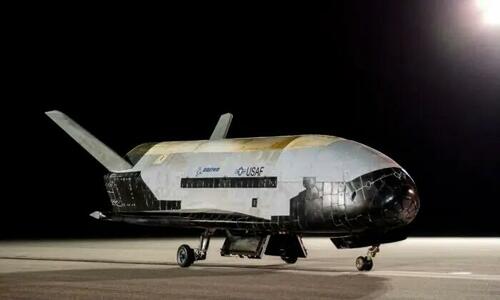
The US Space Force launched a secretive plane on Thursday which has been equipped with heavier boosters that could feasibly send it further into orbit than ever before.
The launch marks the 9th flight of the three-core SpaceX Falcon Heavy booster, and the 7th flight of the US Air Force's (not so) secret unmanned spaceplane, the X-37B (USSF-52).

The launch was previously scheduled for Dec. 10, however it was scrapped due to issues with ground equipment just 30 minutes before liftoff - pushing the event back 18 days.
Officially, the X-37B will enter into various orbits around Earth and serve as a testing ground for NASA's study of the effects of long-duration exposure to space on organic materials, the Epoch Times reports, adding that the mission will also include experiments having to do with "space domain awareness," which the US Space Force defines as the ability to "rapidly detect, warn, characterize, attribute, and predict threats to national, allied, and commercial space systems."
Testing of such threat-detection technologies comes as tensions between the United States and a space-faring communist China remain high.
The Falcon Heavy has now launched five times in 2023, and while the space-enamored public is becoming more familiar with it, its cargo largely remains a mystery.
First launched in April 2010, much of the 29-foot-long robotic vehicle’s activities during its 3,774 total days in space remain classified. Even its return date remains unknown.
Designed by Boeing and operated by the United States Air Force Rapid Capabilities Office, the X-37B—also known as OTV-7—can fly as high as 500 miles above the Earth’s surface and carry out missions lasting 270 days. -Epoch Times
Previous missions involving the craft have included experiments involving Naval Research Laboratory experiments designed to harness solar energy and transmit power to the ground, as well as testing the effect of organic material's long-duration exposure to space.
The X-37B is similar to the retired space shuttle - in that it has a cargo bay, black-tiled heat shielding, and the ability to land like an airplane. That said, it clocks in at roughly 25% the size of the shuttle, offering what Boeing describes as "the best of aircraft and spacecraft into an affordable system that is easy to operate and maintain."
The US Space Force launched a secretive plane on Thursday which has been equipped with heavier boosters that could feasibly send it further into orbit than ever before.
The launch marks the 9th flight of the three-core SpaceX Falcon Heavy booster, and the 7th flight of the US Air Force’s (not so) secret unmanned spaceplane, the X-37B (USSF-52).

The launch was previously scheduled for Dec. 10, however it was scrapped due to issues with ground equipment just 30 minutes before liftoff – pushing the event back 18 days.
Officially, the X-37B will enter into various orbits around Earth and serve as a testing ground for NASA’s study of the effects of long-duration exposure to space on organic materials, the Epoch Times reports, adding that the mission will also include experiments having to do with “space domain awareness,” which the US Space Force defines as the ability to “rapidly detect, warn, characterize, attribute, and predict threats to national, allied, and commercial space systems.”
Testing of such threat-detection technologies comes as tensions between the United States and a space-faring communist China remain high.
The Falcon Heavy has now launched five times in 2023, and while the space-enamored public is becoming more familiar with it, its cargo largely remains a mystery.
First launched in April 2010, much of the 29-foot-long robotic vehicle’s activities during its 3,774 total days in space remain classified. Even its return date remains unknown.
Designed by Boeing and operated by the United States Air Force Rapid Capabilities Office, the X-37B—also known as OTV-7—can fly as high as 500 miles above the Earth’s surface and carry out missions lasting 270 days. -Epoch Times
Previous missions involving the craft have included experiments involving Naval Research Laboratory experiments designed to harness solar energy and transmit power to the ground, as well as testing the effect of organic material’s long-duration exposure to space.
The X-37B is similar to the retired space shuttle – in that it has a cargo bay, black-tiled heat shielding, and the ability to land like an airplane. That said, it clocks in at roughly 25% the size of the shuttle, offering what Boeing describes as “the best of aircraft and spacecraft into an affordable system that is easy to operate and maintain.”
Loading…





